BBC faces privatisation calls from influential conservative think-tank to combat left-wing bias
Institute of Economic Affairs claims that Britain’s national broadcaster is ‘no longer fit for purpose’

An influential conservative think-tank, with links to the Culture Secretary John Whittingdale, will call for the wholesale privatisation of the BBC to combat its left wing bias.
In a controversial report the Institute of Economic Affairs claims that Britain’s national broadcaster is “no longer fit for purpose”.
It cites a new analysis of BBC output suggesting that the organisation is biased against big business, free market economics and campaigners who want to pull Britain out of the European Union.
In contrast, it claims, the corporation has a left wing bias on issues such as gender pay equality, global warning and Government cuts.
It concludes that if the BBC were to be privatised the public would become “more appropriately sceptical” about potential bias while the corporation would “bear a considerable commercial cost” if its reputation were impaired.
The timing of the report is significant because it comes as the Government draws up the terms of the BBC’s new Royal Charter which will come into effect next year.
Many aspects of the BBC’s future funding and remit still undecided and some believe Mr Whittingdale is in favour of reducing the corporation’s scope and influence over national life.

Two years ago Mr Whittingdale, who was then chairman of the Culture, Media and Sport Select Committee spoke at a private breakfast for “selected IEA supporters and donors” on the “future sustainability” of the BBC.
He has also been on panels of IEA fringe events at Conservative Party conferences.
The IEA’s 140 page report ‘the case for privatising the BBC’ says the argument from a radical change in the way in which the Corporation is run and funded is “multi-faceted”.
It says technology has changed the commercial landscape of broadcasting and have “demolished the economic and practical arguments for the licence fee and the BBC’s privileged position”.
It adds that the case for public service broadcasting is weaker than ever given increased competition through the internet.
But much of the report is dedicated to allegations of BBC bias which, it argues is problematic because of its reputation and ability to change public opinion.
Among the evidence the reports presents is:
* Voices favouring Britain’s exit from the EU have tended to be under-represented on Radio 4’s Today programme. From March 2004 to July 2015 it say there were 4,275 guest speakers on EU themes but just three per cent were explicitly in favour of Britain’s withdrawal.
* In a sample of 976 separate editions of Radio 4’s Thought for the Day, 167 included discussions on economics, business and finance. But two thirds of speakers expressed a negative opinion on capitalism, markets and business, whilst just 8 per cent gave any sort of positive perspective.
* A third of stories on the BBC website between 2012 and 2015 that mentioned ‘Amazon’ and ‘tax avoidance’ conflated corporation tax paid by companies with sales revenues – which has nothing to do with the tax base for corporation tax which is profit.
“Given the BBC’s reach, and the trust placed in it, any biases could potentially have a much more significant impact on altering public understanding of an issue than biases arising on other media platforms,” the report says.
“Privatisation would not lead to or guarantee the elimination of relative biases from coverage. However, privatisation could lead to change over time and a more sceptical viewing public.
“Most importantly of all, however, privatisation gives the right of exit to those who do not wish to listen to the programmes broadcast by the BBC. If the normal competition rules applied to the BBC, there would also be a greater plurality of positions.”
Mark Littlewood, Director General at the IEA added privatisation would also free up the corporation to global expansion and competition.
“The BBC needs a business and ownership model more appropriate than the one designed the best part of 100 years ago,” he said.
“Keeping a publicly funded broadcaster, with a Charter drafted by politicians, risks seeing the BBC eclipsed by new technology in the same way that Royal Mail has been eclipsed by email.
“The ending of the licence fee and the privatisation of the BBC would permit the BBC to compete freely and aggressively with other global media businesses.”
But a BBC spokesman dismissed the report, saying: “The IEA’s views on the BBC are at odds with the public which backs the licence fee and rates the BBC number one for trusted and impartial news. We have clear guidelines on impartiality, and this looks like selective use of data to paint a misleading picture by a group with a clear agenda.”
Meanwhile the former BBC chairman Lord Patten claimed the organisation was being “excessively deferential” to the pro-Brexit case because of concerns over the pending renewal charter renewal.

Lord Patten said it was sometimes going too far to demonstrate “balance” because the shadow of the process led by an anti-EU Culture Secretary was “hanging over it”.
“The BBC has an extremely difficult job. It is having to cover this referendum with the shadow of a charter review and Mr Whittingdale hanging over it,” he told the Today programme.
“I think that may make people excessively deferential when trying to produce balance.
”You have the Governor of the Bank of England on, or the IMF chief, so you feel obliged to put up some Conservative backbencher that nobody has ever heard of on the other side of the argument.
“It does occasionally raise eyebrows. But I think I would prefer the BBC to be being criticised for being excessively balanced rather than for doing anything else.
”It is a very great broadcaster which is dedicated to telling the truth and that is an unusual thing in the world of the media.“
Join our commenting forum
Join thought-provoking conversations, follow other Independent readers and see their replies
Comments
Bookmark popover
Removed from bookmarks